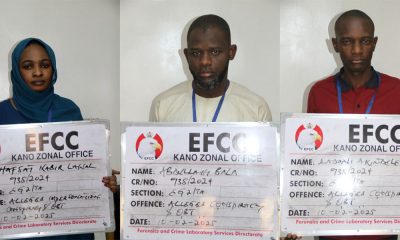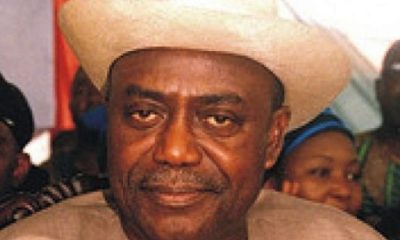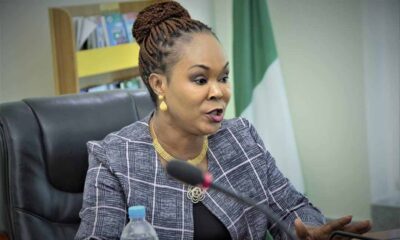News
Falana tackles Agbakoba over EFCC legal status

Falana tackles Agbakoba over EFCC legal status
Human rights activist and lawyer, Femi Falana (SAN), has written to the President of the Senate, Senator Godswill Akpabio, and the Speaker of the House of Representatives, Tajudeen Abbas, to oppose the view expressed by the ex-president of the Nigerian Bar Association, Dr Olisa Agbakoba (SAN), regarding the legal status of the Economic and Financial Crimes Commission (EFCC).
In a letter dated 17 October 2024, Falana disagreed with Agbakoba’s assertion that the EFCC is an “unlawful organisation.”
The letter read: “Our attention has been drawn to separate letters addressed to the Senate and House of Representatives, dated 14 October 2024, entitled: ‘Re: Urgent Legislative Attention on Constitutional Reforms Relating to Law Enforcement Agencies and Anti-Corruption Efforts,’ in which Dr Olisa Agbakoba argued that the power under which the EFCC was established exceeds the powers of the National Assembly.
“Convinced that the Economic and Financial Crimes Commission is ‘an unlawful organisation’ because it was ‘unconstitutionally established,’ Agbakoba stated that he was pleased to see many states challenging the constitutionality of the EFCC.”
Falana further stated that Agbakoba did not cite any case to substantiate his claim that the Supreme Court had criticised the EFCC’s activities and existence.
He stated, “Even though Dr Agbakoba did not refer to any particular case, he claimed that the Supreme Court has often criticised the EFCC. On the contrary, the Supreme Court has consistently supported the efforts of both the ICPC and EFCC in combating the miasma of monumental corruption in the country.”
Falana also noted that Agbakoba’s position was based on the premise that the establishment of the EFCC violated the basic principles of federalism.
READ ALSO:
- Orji Kalu: N14m I earn monthly as senator not enough for fuel, others
- Students protest, burn provost’s residence in Kebbi over extortion
- Oyan Dam: Prepare to relocate, Lagos govt tells residents
“It is pertinent to recall that in the celebrated case of the Attorney-General of Ondo State v Attorney-General of the Federation & Ors (2022) 27 WRN 1, the Plaintiff (Ondo State Government) challenged the constitutional validity of the Independent Corrupt Practices and Other Related Offences Commission Act, 2000. The Attorney-General of Ondo State was the Plaintiff, while the Attorney-General of the Federation and the Attorneys-General of 35 states were the Defendants.
“In that case, the late Professor Ben Nwabueze and Dr Agbakoba acted as amici curiae, while I was privileged to represent one of the Defendants. It is on record that several Defendants and the amici curiae argued extensively that the ICPC Act was unconstitutional in every material particular. Both amici curiae urged the court to annul the ICPC Act.
“Upon critically analysing the submissions of all counsel, including the amici curiae, the apex court upheld the constitutional validity of the ICPC Act. In the leading judgment delivered by Uwais CJN (as he then was), it was held that the National Assembly has the sole power to establish and regulate authorities for the federation or any part thereof to promote and enforce the nation’s responsibility to abolish all corrupt practices and abuse of power, as enshrined in section 15(5) of the 1999 CFRN.
“If this is a breach of the principles of federalism, then, I am afraid, it is the Constitution itself that facilitates the breach. As long as the aberration is supported by the provisions of the Constitution, it cannot rightly be argued that any illegality has occurred due to the Constitution’s failure to adhere to cardinal principles, which are at best ideals for guidance in an ideal situation… the provisions of Section 13 thereof apply to all organs of government and all authorities and persons exercising legislative, executive, or judicial powers.”
He added, “The provisions do not distinguish between Federal, State or Local Governments. Again, the provisions of Section 14 subsection (4) specifically apply to the government or council, and the conduct of the affairs of the government or council or such agencies.” See Olafisoye v. FRN (2004) 4 NWLR (Pt. 864) 580.
“Even though we cannot comment on the merit of the pending case at the Supreme Court of Nigeria, it is pertinent to refer members of the National Assembly to the case of Attorney-General of Abia State v Attorney-General of the Federation (2024) LPELR-62576 (SC). In that case, the Plaintiff argued that the EFCC’s power to prosecute financial crimes did not extend to managing the accounts of the Abia State Government.
“The Plaintiff sought declarations, including a perpetual injunction, to prevent the EFCC from taking such actions, including freezing its bank accounts. The Defendant (AGF) filed a preliminary objection, arguing that it had been incorrectly sued, as the EFCC was an independent body outside its lawful management and control.
READ ALSO:
- We ate leaves, drank filthy water to survive, say ex-corps members
- We will enforce anti-open grazing law — Delta govt
- We will enforce anti-open grazing law — Delta govt
“In upholding the Defendants’ preliminary objection, the Supreme Court held that the case did not disclose any dispute between the Plaintiff and the Defendants within the meaning of section 232(1) of the Constitution, and that there was no complaint against the first Defendant (AGF) as representing the Federal Government, as all the complaints were against the EFCC.”
Speaking further, Falana noted that since the establishment of the EFCC, no one had challenged the legality of the EFCC Act in any court of law.
“Consequently, the Supreme Court struck out the case but held that the Plaintiff is at liberty to sue the EFCC, but not in the Supreme Court, as the EFCC is neither a state nor the federation. We wish to state without any fear of contradiction that no state government has followed the advice of the apex court by filing a suit to challenge the constitutionality of the EFCC Act in a court of competent jurisdiction.
“However, several former governors have continued to question the EFCC’s authority to arrest, investigate, and prosecute them for the criminal diversion of public funds belonging to state governments. For instance, in the case of Nyame vs. the Federal Republic of Nigeria (2010) 3 SC (Pt.1) 78, the Supreme Court held, inter alia: ‘Sections 6(m) and 46 of the Economic and Financial Crimes Commission (Establishment) Act vest the EFCC with the function and duty of investigating and prosecuting persons suspected of engaging in financial crimes. It is unreasonable for a person to rush to court to place a clog or shield against criminal investigation and prosecution’.”
Arguing further, Falana stated, “In view of the duty imposed on the state by Section 15(5) of the Constitution to ‘abolish all corrupt practices and abuse of power’, the Supreme Court, in the case of Shema vs. Federal Republic of Nigeria (2018) 9 NWLR (Pt. 1624) 337 at 398, held that ‘in the co-operative federalism practised in Nigeria, the EFCC is a common agency empowered to investigate and prosecute offenders for both federal and state economic and financial crimes and as such qualifies as ‘any other authority or person’ empowered by section 211(1)(b) of the Constitution to institute or initiate criminal proceedings’.”
“The EFCC is the coordinating agency for the enforcement of the provisions of any other law or regulation on economic and financial crimes, including the Criminal Code and Penal Code. The Commission has powers under section 13(2) of the EFCC Act to prosecute offences as long as they are financial crimes.”
Falana criticised some state governments for seeking to frustrate the Federal Government’s anti-graft initiatives instead of supporting these agencies to thrive.
He added, “Instead of ensuring that the EFCC, ICPC, and Code of Conduct Bureau serve as ‘common agencies’ of the people of Nigeria in combating monumental corruption, some state governments have shown a tendency to terminate grave economic and financial crimes by filing nolle prosequi applications.
“Others typically rush to either State High Court or Federal High Court to obtain frivolous court injunctions to frustrate the prosecution of serving public officers, thereby making a mockery of public accountability and transparency in government.”
Falana urged the National Assembly to seize the opportunity provided by the ongoing Constitution amendment to resolve questions about the legality of the EFCC and the Independent Corrupt Practices and Other Related Offences Commission by entrenching both in the Constitution.
“In light of the foregoing, we urge members of the National Assembly to take advantage of the ongoing constitutional review to end the diversionary debate about the validity of the EFCC Act and ICPC Act by entrenching both the Economic and Financial Crimes Commission and the Independent Corrupt Practices and Other Related Offences Commission in the Constitution.
“In other words, if both commissions are constitutionalised, they will be protected and strengthened to fight the menace of corruption and money laundering,” Falana stated.
Falana tackles Agbakoba over EFCC legal status
News
Rivers: Tinubu acted to save state, economy, says Karimi
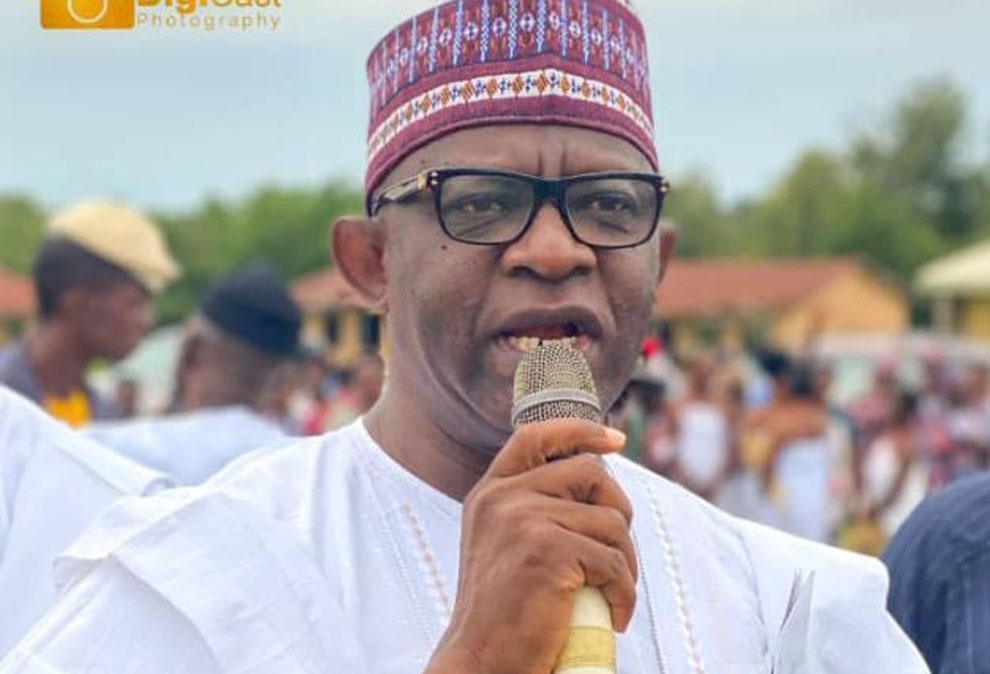
Rivers: Tinubu acted to save state, economy, says Karimi
Chairman of the Senate Services Sunday Karimi has hailed President Bola Tinubu for the decision to declare a state of emergency in Rivers State.
He told reporters on Friday in Abuja that the President acted in the best interest of the State and Nigeria, having taken his decision in compliance with the Constitution.
“No President or government worth a name, will fold its arms and watch a political situation deteriorate to what we saw unfolding in Rivers State.
“We saw that bombing of pipelines had begun, and the security situation was getting worse with the tension everywhere”, Karimi stated.
Karimi, who represents Kogi-West on the ticket of the All Progressives Congress (APC), recalled the “fatherly role” Tinubu had played in the crisis since 2023 in a bid to get the Minister of the Federal Capital Territory (FCT), Nyesom Wike, and suspended Governor Siminalayi Fubara to reach an understanding, to no avail.
He explained: “We were all here in 2023 when Mr President called that truce meeting at the Aso Rock Villa. There was the eight-point agenda for settlement reached between the factions.
“When Nigerians expected that progress should be made to achieve peace, things started deteriorating considerably to a point where the governor demolished the House of Assembly building and administered the state with only three legislators.”
READ ALSO:
- Oluwo accuses Ooni of plotting to dethrone him
- Natasha: Court blocks recall attempt, stops INEC
- US ends legal status for 500,000 immigrants
Karimi observed that with the recent judgment of the Supreme Court, which gave the upper hand to the 27 lawmakers loyal to the camp of the FCT Minister, matters merely got worse in the State as the lawmakers were set to impeach the Governor.
“What did you expect would be the implications? There would have been more destruction, killings and economic losses for the country.
“With the bombings that had already started, it was a matter of time before the whole state would be engulfed in flames. No responsible President would sit, arms folded, and allow that to happen “ he added.
The senator further argued that it took “painstaking efforts” by the administration to raise daily crude oil production to around 1,800 barrels, noting that Nigeria’s economy was already “witnessing a rebound under the renewed hope projects of the government.”
“Allowing the situation in Rivers to get worse before he would act, wouldn’t have helped the state or Nigeria as a country in any way.
“Mr. President intervened at the right time, and his actions are covered by law,” he said.
Karimi also spoke on the emergency declaration in Borno, Yobe, Adamawa and a couple of other states by former President Goodluck Jonathan without removing the Governors from office or suspending the state assemblies.
According to him, the case with those States was not generated by political crises but rather security concerns.
“So, I will advise those comparing the two scenarios to remember that one was purely about security threats resulting from the insurgency caused by Boko Haram, while that of Rivers is clearly political.
“It was the proper thing to do to suspend the political actors in the two factions to allow for tensions to diffuse. Nigerians should appreciate the President for the action he has taken so far,” he stated.
Sen. Karimi also noted that there was no cause for alarm as the National Assembly had indicated that the emergency rule could be reviewed as soon as there were signs that things could quickly normalise in Rivers State.
Rivers: Tinubu acted to save state, economy, says Karimi
News
Just in: Tinubu swears in Rivers Sole Administrator Ibas
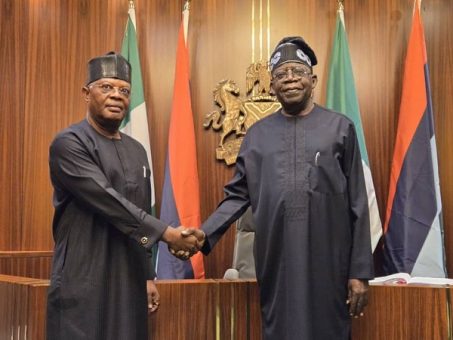
Just in: Tinubu swears in Rivers Sole Administrator Ibok-ete Ibas
President Bola Tinubu has sworn in Vice Vice Admiral Ibok-ete Ibas (Retd.) as the Sole Administrator of Rivers State.
The administrator was sworn in on Wednesday after a short meeting with the President.
Tinubu announced the appointment of the retired naval chief at a nationwide broadcast on Tuesday, when he declared a state of emergency in Rivers State and suspended Governor Siminalayi Fubara, Deputy Governor, Ngozi Odu, and the state House of Assembly members.
The President said his decision was based on Section 305 of the 1999 Constitution, saying he could not continue to watch the political situation in Rivers escalate without taking concrete action.
The suspension of Fubara and other elected representatives has been rejected and condemned by many eminent Nigerians, legal luminaries, groups such as Atiku Abubakar, Peter Obi, Femi Falana, the Labour Party (LP), the Peoples Democratic Party (PDP) and the Nigerian Bar Association.
However, the emergency rule has been praised by the pro-Nyesom Wike Assembly led by Martins Amaewhule, accusing Fubara of contravening the Supreme Court ruling on the political situation in the state.
Ibas was the Chief of Naval Staff from 2015 to 2021.
He is from Cross River State where he had his early education.
The new sole administrator went to the Nigerian Defence Academy in 1979 from where he proceeded to have a successful career in the Navy, rising through the ranks to the very top.
He is a member of the Nigerian Institute of International Affairs (NIIA) and the Nigerian Institute of Management.
President Muhammadu Buhari who appointed him as Chief of Naval Staff conferred him with the National Honour of Commander of the Federal Republic (CFR) in 2022.
News
Breaking: Tinubu declares state of emergency in Rivers State

Breaking: Tinubu declares state of emergency in Rivers State
President Bola Tinubu on Tuesday night declared a state of emergency in Rivers State following the protracted political crisis in the state.
Tinubu made the declaration during a nationwide broadcast, saying it is for six months.
He announced the suspension of the Executive Governor, Siminalayi Fubara, his deputy and all the members of the House of Assembly for six months.
He immediately named an administrator, Vice Admiral Ibok-Ete Ibas (Retd), to take charge of the affairs of the state for the six-month period.
Section 305 of the 1999 Constitution interprets a state of emergency as a situation of national danger or disaster in which a government suspends normal constitutional procedures to regain control.
A state of emergency allows the President to immediately make any desired regulations to secure public order and safety. (Channels TV)
-

 International2 days ago
International2 days agoUK announces new passport application fees starting April 2025
-

 metro23 hours ago
metro23 hours ago‘We’re not hiring,’ NNPC denies viral recruitment adverts
-
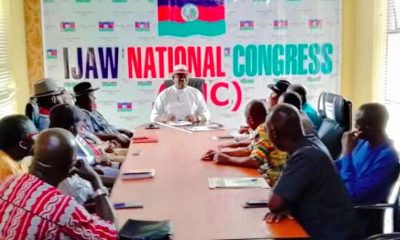
 metro1 day ago
metro1 day agoMore trouble brews in Rivers as Ijaw congress considers self-determination option
-

 metro2 days ago
metro2 days agoCourt lifts order stopping Senate probe on Natasha Akpoti
-

 metro2 days ago
metro2 days agoMohbad’s brother, Adura, arrested by police in Lagos
-

 metro3 days ago
metro3 days agoTanker explodes on Abuja bridge, many feared dead, 30 vehicles burnt
-
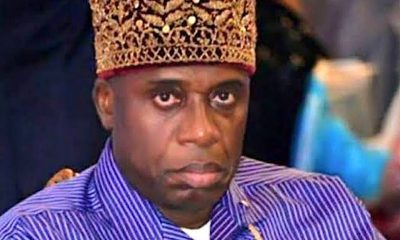
 Politics3 days ago
Politics3 days agoEmergency rule cannot stand in Rivers, says Amaechi, mobilises against Tinubu
-
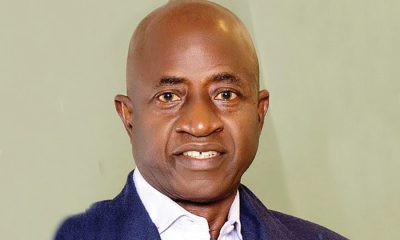
 Sports8 hours ago
Sports8 hours agoOdegbami speaks on Osimhen breaking his 44-year goals record

